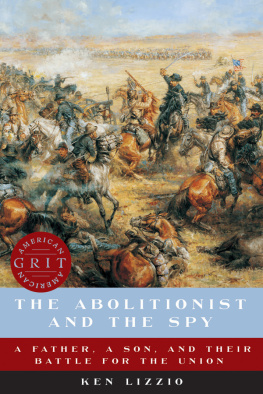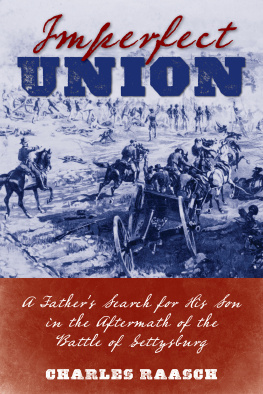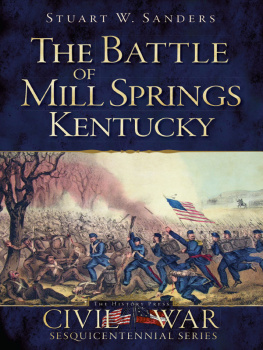Ken Lizzio - The Abolitionist and the Spy: A Father, a Son, and Their Battle for the Union
Here you can read online Ken Lizzio - The Abolitionist and the Spy: A Father, a Son, and Their Battle for the Union full text of the book (entire story) in english for free. Download pdf and epub, get meaning, cover and reviews about this ebook. year: 2020, publisher: Countryman Press, genre: Detective and thriller. Description of the work, (preface) as well as reviews are available. Best literature library LitArk.com created for fans of good reading and offers a wide selection of genres:
Romance novel
Science fiction
Adventure
Detective
Science
History
Home and family
Prose
Art
Politics
Computer
Non-fiction
Religion
Business
Children
Humor
Choose a favorite category and find really read worthwhile books. Enjoy immersion in the world of imagination, feel the emotions of the characters or learn something new for yourself, make an fascinating discovery.
- Book:The Abolitionist and the Spy: A Father, a Son, and Their Battle for the Union
- Author:
- Publisher:Countryman Press
- Genre:
- Year:2020
- Rating:5 / 5
- Favourites:Add to favourites
- Your mark:
- 100
- 1
- 2
- 3
- 4
- 5
The Abolitionist and the Spy: A Father, a Son, and Their Battle for the Union: summary, description and annotation
We offer to read an annotation, description, summary or preface (depends on what the author of the book "The Abolitionist and the Spy: A Father, a Son, and Their Battle for the Union" wrote himself). If you haven't found the necessary information about the book — write in the comments, we will try to find it.
Ken Lizzio: author's other books
Who wrote The Abolitionist and the Spy: A Father, a Son, and Their Battle for the Union? Find out the surname, the name of the author of the book and a list of all author's works by series.
The Abolitionist and the Spy: A Father, a Son, and Their Battle for the Union — read online for free the complete book (whole text) full work
Below is the text of the book, divided by pages. System saving the place of the last page read, allows you to conveniently read the book "The Abolitionist and the Spy: A Father, a Son, and Their Battle for the Union" online for free, without having to search again every time where you left off. Put a bookmark, and you can go to the page where you finished reading at any time.
Font size:
Interval:
Bookmark:


THE
ABOLITIONIST
AND THE SPY
A Father, a Son, and
Their Battle for the Union
KEN LIZZIO

We welcome your comments and suggestions. Please contact
Editor
The Countryman Press
500 Fifth Avenue
New York, NY 10110
or e-mail countrymanpress@wwnorton.com
Copyright 2020 by Ken Lizzio
All rights reserved
For information about permission to reproduce selections from this book, write to
Permissions, The Countryman Press, 500 Fifth Avenue, New York, NY 10110
For information about special discounts for bulk purchases, please contact
W. W. Norton Special Sales at specialsales@wwnorton.com or 800-233-4830
Cover artwork: The Battle of Mine Creek Andy Thomas
Library of Congress Cataloging-in-Publication Data is available
The Countryman Press
www.countrymanpress.com
A division of W. W. Norton & Company, Inc.
500 Fifth Avenue, New York, NY 10110
www.wwnorton.com
978-1-68268-471-9 (pbk.)
9781682684726 (ebk.)
CONTENTS
O N A BITTERLY COLD EVENING IN J ANUARY 1862, A brash young seaman in the Union Navy named Spencer Kellogg Brown paced uneasily aboard the gunboat Essex. Hunched against the cold, he strode back and forth across the deck, debating the wisdom of a bold plan he wished to propose to the ships captain. It was a risky gambit, and each time a niggling doubt arose, he had to remind himself that he had received an important assignment once before by impressing his commanding officer with his pluck and daring.
The previous August, while serving as a private in the Unions western army under General Nathaniel Lyon, the nineteen-year-old had led a body of scouts to identify rebel strength and positions. He had so impressed Lyons successor, General John C. Frmont, that Frmont had tasked him with recruiting the Lyon Legion, a body of Union scouts attached to the 24th Missouri Volunteer Infantry. Frmont himself had given Spencer the assignment with the promise of a captains commission. But when Frmont issued an emancipation edict that freed slaves in his district, an angry President Lincoln relieved the impulsive general of his command for insubordination. With Frmonts dismissal, both Spencers mission and his promotion had evaporated. Feeling the army had reneged on its commitment, Spencer cast about for a new opportunity, one where he could show his mettle and advance quickly through the ranks. He chose the Union Navy in the belief it would be the deciding factor in the war.
When the Civil War broke out, both sides recognized the importance of controlling the countrys major rivers. Not only did they offer a swift means of moving men and matriel, they were vital arteries for the Confederate economy. At the outset of the war, Union General Winfield Scott proposed a sweeping plan aimed at dividing the Confederacy in two. Dubbed the Anaconda Plan, it consisted of blockading Southern ports and gaining control of the Mississippi River. Control the Mississippi, Scott believed, and you would strangle the Confederacy.
Even though the Union had taken control of large swaths of the Mississippi, one Confederate battery had proved particularly resistant to attack: the batteries at Columbus, Kentucky. The batteries had been constructed the previous September by General Leonidas Polk, who saw Columbus as a highly strategic position from which to thwart any advance of Union troops. Known as the Fighting Bishop for having been a clergyman prior to the war, Polk had fortified the river bluffs and had drawn a massive chain of foot-long links clear across the river to Belmont, Missouri, to block Union gunboats and supply ships from passing. With Union boats stymied above Columbus, Polk proudly declared his fortified riverine garrison the Gibraltar of the West.
In November, Frmont ordered General Ulysses S. Grant to take Belmont. Descending by riverboat from Cairo, Illinois, with three thousand men, Grant landed above the town and took the Confederates by surprise, seizing hundreds of prisoners and driving off several infantry regiments. But the Confederates quickly counterattacked, eventually pushing Grant back, thanks to a thunderous barrage of artillery fire from Polks batteries. The pice de rsistance of Polks artillery was a fifteen-thousand-pound howitzer, the Lady Polk, named after the good generals wife.
Two months later, while the Essex was docked at Cairo, the ships commander, Captain William D. Porter, received word that several enemy vessels were towing a large floating battery upriver from Columbus. In a thick early morning fog, Porter quickly disembarked, accompanied by the gunboat St. Louis. Four miles north of Columbus, he engaged the enemy at Lucas Bend. Thanks to Porters foresight in modifying what was originally a timberclad gunboat into a heavily armed ironcladand without official authorizationPorter was able to force three Confederate gunboats to retreat to Polks iron batteries. Protected as they were by Polks batteries, Porter was unable to pursue the ships. Frustrated, he returned to Cairo to reprovision.
The son of the distinguished Commodore David D. Porter, and a highly capable navy commander in his own right, Captain Porter had found no solution to the Confederate conundrum at Columbus. Now nearly two weeks after the Battle of Lucas Bend, Spencer Kellogg Brown was traipsing the deck of the Essex, pondering whether to share his idea for cracking Polks impregnable fortress at Columbus with the commander. Gathering his courage, he marched up to the deckhouse and asked Captain R. K. Riley, the Executive Officer, permission to speak with Porter in private.
Seeing the lanky youth standing furtively at the door, Porter ejected Riley from the room and shouted, Come in, young man. Speak quick! Clearing his throat nervously, Spencer said, Id like to volunteer my services, sir, as a spy.2 His plan, he explained, was to cross over to Columbus with a shipmate, Trussel, and pose as deserters so they could map Polks river batteries. As Porter listened in silence, Spencer laid out the details of his dangerous scheme. Porter then asked a few questions, answers to which Spencer had already thought out. Impressed with the plan, Porter approved. The time allotted for their absence would be ten days.
The next day the tug attending the Essex took Spencer and Trussel up to Cairo to make preparations. In Spencers pocket were leave of absence papers and a pair of irons he intended to have twisted apart to bolster his ruse. He also had nearly a hundred dollars given to him by his shipmates for purchases. At noon, having satisfactorily acquitted their business, the two enjoyed a tasty meal of fried Mississippi Gulf oysters. After spending a leisurely afternoon at billiards, they got back to the Essex around dark. At the ships cashier, Spencer deposited seven and a half dollars, and, keeping three dollars in specie, took a receipt that he gave to a friend to keep. He then left word to wake him and his comrade at half past two in the morning. When they awoke it was so cold that they put on an extra layer of clothing. They then dropped into a skiff and began their mock escape. In the darkness they drifted downriver toward an uncertain fate. When they had gone some distance from the ship, they could hear the mournful bell of the Essex sounding three oclock. After just thirty minutes on the water, the two boys were shivering and began moving vigorously to stay warm. When they tried to muffle the oars with handkerchiefs, the water froze the cloth hard as rocks, rendering them useless. Spencer then had his comrade place the irons on his wrists but quickly removed them on account of the intense cold, deciding to wait until they were within sight of Columbus before putting them on. After two hours on the water, they came across the Confederate ship, the CSS Grampus, anchored in the river, but they went unnoticed. As the lights of Columbus came into sight, they conducted a last-minute search for any letters or papers in their possession they had neglected to destroy. At dawn they finally reached the city where the rebel steamer Charm was docked. When their hails to the men on board failed to bring any answer, they climbed on board. Once on deck, they succeeded in catching someones attention and announced they were deserters from the North. Immediately, they were escorted to General Polk.
Font size:
Interval:
Bookmark:
Similar books «The Abolitionist and the Spy: A Father, a Son, and Their Battle for the Union»
Look at similar books to The Abolitionist and the Spy: A Father, a Son, and Their Battle for the Union. We have selected literature similar in name and meaning in the hope of providing readers with more options to find new, interesting, not yet read works.
Discussion, reviews of the book The Abolitionist and the Spy: A Father, a Son, and Their Battle for the Union and just readers' own opinions. Leave your comments, write what you think about the work, its meaning or the main characters. Specify what exactly you liked and what you didn't like, and why you think so.










